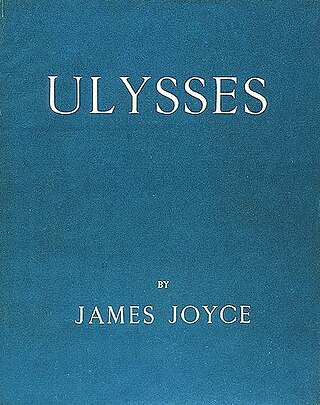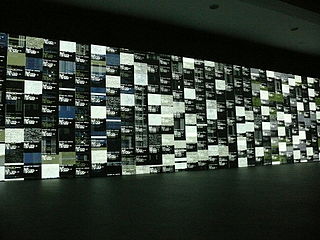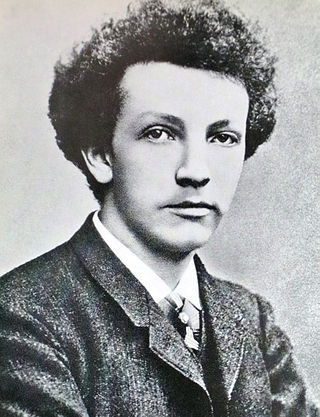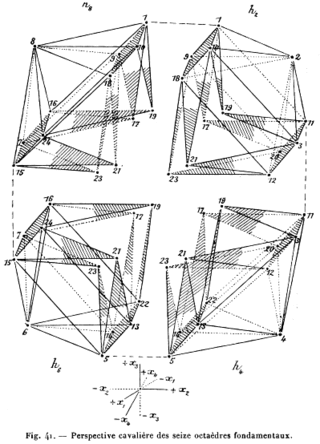
Modernism is both a philosophical and arts movement that arose from broad transformations in Western society during the late 19th and early 20th centuries. The movement reflected a desire for the creation of new forms of art, philosophy, and social organization which reflected the newly emerging industrial world, including features such as urbanization, architecture, new technologies, and war. Artists attempted to depart from traditional forms of art, which they considered outdated or obsolete. The poet Ezra Pound's 1934 injunction to "Make it New" was the touchstone of the movement's approach.
Postmodernism is an intellectual stance or mode of discourse characterized by skepticism toward the "grand narratives" of modernism; rejection of epistemic certainty or the stability of meaning; and sensitivity to the role of ideology in maintaining political power. Claims to objectivity are dismissed as naïve realism, with attention drawn to the conditional nature of knowledge claims within particular historical, political, and cultural discourses. The postmodern outlook is characterized by self-referentiality, epistemological relativism, moral relativism, pluralism, irony, irreverence, and eclecticism; it rejects the "universal validity" of binary oppositions, stable identity, hierarchy, and categorization.

Ulysses is a modernist novel by Irish writer James Joyce. Parts of it were first serialized in the American journal The Little Review from March 1918 to December 1920, and the entire work was published in Paris by Sylvia Beach on 2 February 1922, Joyce's fortieth birthday. It is considered one of the most important works of modernist literature and has been called "a demonstration and summation of the entire movement." According to Declan Kiberd, "Before Joyce, no writer of fiction had so foregrounded the process of thinking."

Arnold Schoenberg or Schönberg was an Austrian-American composer, music theorist, teacher, writer, and painter. He is widely considered one of the most influential composers of the 20th century. He was associated with the expressionist movement in German poetry and art, and leader of the Second Viennese School. As a Jewish composer, Schoenberg was targeted by the Nazi Party, which labeled his works as degenerate music and forbade them from being published. He emigrated to the United States in 1933, becoming an American citizen in 1941.
In literary criticism, stream of consciousness is a narrative mode or method that attempts "to depict the multitudinous thoughts and feelings which pass through the mind" of a narrator. The term was coined by Daniel Oliver in 1840 in First Lines of Physiology: Designed for the Use of Students of Medicine, when he wrote,
If we separate from this mingled and moving stream of consciousness, our sensations and volitions, which are constantly giving it a new direction, and suffer it to pursue its own spontaneous course, it will appear, upon examination, that this, instead of being wholly fortuitous and uncertain, is determined by certain fixed laws of thought, which are collectively termed the association of ideas.
Modernity, a topic in the humanities and social sciences, is both a historical period and the ensemble of particular socio-cultural norms, attitudes and practices that arose in the wake of the Renaissance—in the "Age of Reason" of 17th-century thought and the 18th-century "Enlightenment". Some commentators consider the era of modernity to have ended by 1930, with World War II in 1945, or the 1980s or 1990s; the following era is called postmodernity. The term "contemporary history" is also used to refer to the post-1945 timeframe, without assigning it to either the modern or postmodern era.

Postmodern art is a body of art movements that sought to contradict some aspects of modernism or some aspects that emerged or developed in its aftermath. In general, movements such as intermedia, installation art, conceptual art and multimedia, particularly involving video are described as postmodern.
The Counter-Enlightenment refers to a loose collection of intellectual stances that arose during the European Enlightenment in opposition to its mainstream attitudes and ideals. The Counter-Enlightenment is generally seen to have continued from the 18th century into the early 19th century, especially with the rise of Romanticism. Its thinkers did not necessarily agree to a set of counter-doctrines but instead each challenged specific elements of Enlightenment thinking, such as the belief in progress, the rationality of all humans, liberal democracy, and the increasing secularisation of society.

A Sunday Afternoon on the Island of La Grande Jatte was painted from 1884 to 1886 and is Georges Seurat's most famous work. A leading example of pointillist technique, executed on a large canvas, it is a founding work of the neo-impressionist movement. Seurat's composition includes a number of Parisians at a park on the banks of the River Seine. It is in the collection of the Art Institute of Chicago.

In music, modernism is an aesthetic stance underlying the period of change and development in musical language that occurred around the turn of the 20th century, a period of diverse reactions in challenging and reinterpreting older categories of music, innovations that led to new ways of organizing and approaching harmonic, melodic, sonic, and rhythmic aspects of music, and changes in aesthetic worldviews in close relation to the larger identifiable period of modernism in the arts of the time. The operative word most associated with it is "innovation". Its leading feature is a "linguistic plurality", which is to say that no one music genre ever assumed a dominant position.
Inherent within musical modernism is the conviction that music is not a static phenomenon defined by timeless truths and classical principles, but rather something which is intrinsically historical and developmental. While belief in musical progress or in the principle of innovation is not new or unique to modernism, such values are particularly important within modernist aesthetic stances.

Cloisonnism is a style of post-Impressionist painting with bold and flat forms separated by dark contours. The term was coined by critic Édouard Dujardin on the occasion of the Salon des Indépendants, in March 1888. Artists Émile Bernard, Louis Anquetin, Paul Gauguin, Paul Sérusier, and others started painting in this style in the late 19th century. The name evokes the technique of cloisonné, where wires are soldered to the body of the piece, filled with powdered glass, and then fired. Many of the same painters also described their works as Synthetism, a closely related movement.

Jules Laforgue was a Franco-Uruguayan poet, often referred to as a Symbolist poet. Critics and commentators have also pointed to Impressionism as a direct influence and his poetry has been called "part-symbolist, part-impressionist". Laforgue was a model for Pierre-Auguste Renoir, including for Renoir's 1881 painting Luncheon of the Boating Party.
William Romeyn Everdell is an American teacher and author.
Literary modernism, or modernist literature, originated in the late 19th and early 20th centuries and is characterized by a self-conscious break with traditional ways of writing in both poetry and prose fiction writing. Modernism experimented with literary form and expression, as exemplified by Ezra Pound's maxim to "Make it new." This literary movement was driven by a conscious desire to overturn traditional modes of representation and express the new sensibilities of the time. The horrors of the First World War saw the prevailing assumptions about society reassessed, and much modernist writing engages with the technological advances and societal changes of modernity moving into the 20th century. In Modernist Literature, Mary Ann Gillies notes that these literary themes share the "centrality of a conscious break with the past", one that "emerges as a complex response across continents and disciplines to a changing world".

Edmond Aman-Jean was a French symbolist painter, who co-founded the Salon des Tuileries in 1923.

Maurice Princet was a French mathematician and actuary who played a role in the birth of cubism. He was an associate of Pablo Picasso, Guillaume Apollinaire, Max Jacob, Jean Metzinger, and Marcel Duchamp. He is known as "le mathématicien du cubisme".
Wilhelm Olbers Focke was a medical doctor and botanist who in 1881 published a significant work on plant breeding entitled Die Pflanzen-Mischlinge, Ein Beitrag zur Biologie der Gewächse which briefly mentioned Gregor Mendel's discoveries on hybridization. Although Charles Darwin had a copy of Focke's book he passed it along to a colleague apparently without reading this particular section. The rediscovery of Mendel's work is generally considered to have taken place in the first years of the 20th century, however in Die Pflanzen-Mischlinge, Mendel is mentioned about 18 times - although Focke did not apparently take Mendel's work all that seriously. Along with hybridization, Focke analyzed the non-Mendelian phenomena of graft hybrids, pseudogamy, and xenia.
Colin Falck was a British literary critic and poet. He was associate professor in modern literature at York College of Pennsylvania.

Julius Wilhelm Richard Dedekind[ˈdeːdəˌkɪnt] was a German mathematician who made important contributions to number theory, abstract algebra, and the axiomatic foundations of arithmetic. His best known contribution is the definition of real numbers through the notion of Dedekind cut. He is also considered a pioneer in the development of modern set theory and of the philosophy of mathematics known as Logicism.

From Dawn to Decadence: 500 Years of Western Cultural Life is a book written by Jacques Barzun. Published in 2000, it is a large-scale survey history of trends in history, politics, culture, and ideas in Western civilization, and argues that, from approximately the beginning of the 16th century to the end of the 20th century, the arc of Western culture comprises the beginning and ending of a distinct historical era.











